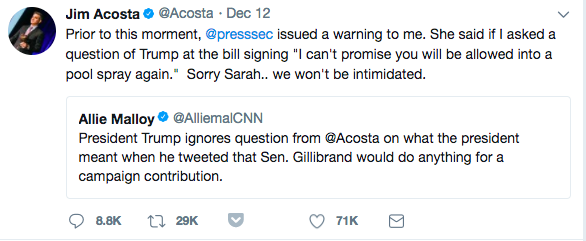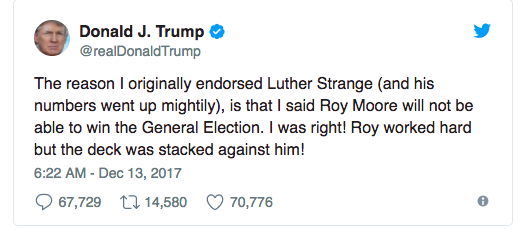US — #WeeklyAddress December 11 –17: The FCC votes to repeal Net Neutrality
Below are the most notable incidents regarding threats to press freedom in the US during the week of December 11 – 17:
FCC repeals net neutrality
On Thursday December 14, the Federal Communications Commission (FCC) voted 3-2 to repeal protections for net neutrality, an Obama-era order which prohibited large Internet Service Providers (ISPs) from using their dominance of the market to block competing content providers, or prevent access to other providers by intentionally speeding up, slowing down, or charging internet users to use their websites. Critics of the repeal worry that the lack of regulations would allow ISPs to reroute users to the sites and search engines they own, having enormous consequences on the free flow of information and the plurality of voices online. This decision will give ISPs the role of regulators and censors, increasing their already considerable power over the way that content is delivered online. As well as having an enormous impact in the United States, this decision will also have colossal repercussions internationally.
Journalists dispute “fake news” with press secretary during White House press briefing
During Monday December 11th’s White House press briefing, press secretary Sarah Huckabee-Sanders and several White House correspondents got into a quarrel after Sanders addressed errors made by ABC News, the Washington Post, and CNN in their recent coverage of President Trump. Sanders alleged that the errors were “nothing more than an individual trying to put their bias into their reporting,” and accused the reporters of intentionally “misleading the American people” by “purposely putting out information [known] to be false.” White House correspondent Jim Acosta of CNN, a network which has time and again been accused of spreading “fake news” by the president, spoke up to make the distinction between genuine errors made in reporting and the purposeful spreading of misinformation. A short back-and-forth ensued, as Sanders and Acosta disputed intention behind the recent misreporting made by CNN and the Washington Post. The errors had already been acknowledged and retracted by both publications at the time of the press briefing.
Last week and the week before, President Trump repeatedly tweeted his response to the erroneous reports, further pushing the narrative that the stories were published to intentionally mislead readers:

He criticized a report from the New York Times on his TV-watching habits, also attacking CNN, MSNBC, and singling out CNN anchor Don Lemon, which prompted a response from Lemon’s network about bullying. In CNN’s statement, the network denounced the president’s attacks, saying "In a world where bullies torment kids on social media to devastating effect on a regular basis with insults and name-calling, it is sad to see our president engaging in the very same behavior himself. Leaders should lead by example."

Don Lemon has received online death threats in the past in connection to his criticism of President Trump.
CNN’s Jim Acosta threatened with access denial to press briefings
CNN’s senior White House correspondent Jim Acosta stated on Tuesday, December 12 that White House press secretary Sarah Huckabee-Sanders threatened to ban him from future pool sprays if he attempted to ask President Trump a question during his signing of the National Defense Authorization bill. Acosta pursued the president anyway, asking him to comment on the recent scandal surrounding his tweet regarding New York Senator Kirsten Gillibrand. The president did not answer Acosta. “Sorry Sarah..” Acosta later tweeted, “we won’t be intimidated.”

Washington Post banned from Roy Moore’s election party
Ahead of December 12th’s US Senate special election between Doug Jones and Roy Moore in Alabama, reports emerged that Roy Moore’s campaign party denied Washington Post journalists entry to his election night party. Campaign party members told ABC News reporter Lauren Walsh that they had already notified the Washington Post the day prior that their credentials had been denied. When The Post reporters showed up, they were “asked to leave.” The Post was the first publication to report sexual misconduct allegations against Moore, who has since been accused by eight different women of molesting them when they were teenagers and he was in his thirties. In response to these allegations, Moore and his party adopted a Trump-style tactic during his campaign, accusing the mainstream media of purposely spreading false information about him, calling them “fake news,” and threatening a lawsuit against The Post for libel.
CNN anchor Anderson Cooper’s Twitter account hacked
On Wednesday, December 13 a tweet from CNN anchor Anderson Cooper’s official account went viral after an alleged hacker used the handle to tweet at President Trump, calling him a “tool,” and a “pathetic loser.” After the tweet was deleted, both Cooper and the CNN Communications team issued statements through Twitter that the account had been hacked, and that Cooper was not responsible for the tweets. Journalists and reporters have an ethical obligation to remain politically unbiased in their reporting, but such a hack like this has the potential to compromise the integrity of both the journalist and the news publication, in this case giving fodder for President Trump to accuse CNN of being biased or “fake news.”


Update: Journalist Jamie Kalven will not have to reveal his source in Jason Van Dyke trial
In an update from last week’s #WeeklyAddress, a Cook County, Illinois judge ruled that independent journalist Jamie Kalven will not have to give up his sources in the trial of Jason Van Dyke, a police officer being charged with the first-degree murder of Laquan McDonald. Van Dyke’s lawyers had attempted to identify Kalven's sources for an expose he published on the murder, suggesting the police department engaged in a cover-up. Kalven's attorney argued that compelling Kalven to reveal his sources was a violation of the Illinois Reporter's Privilege Act. The defense also accused Kalven of leaking evidence to eyewitnesses and intervening in their interviews with the FBI. Ultimately, Judge Vincent Gaughan ruled that sufficient detail was not provided to prove Kalven had tampered with eyewitnesses during the trial and he would not be compelled to reveal his sources.
The United States ranks 43rd out of 180 countries in RSF's 2017 World Press Freedom Index after falling 2 places in the last year.
For the latest updates, follow RSF on twitter @RSF_en.



